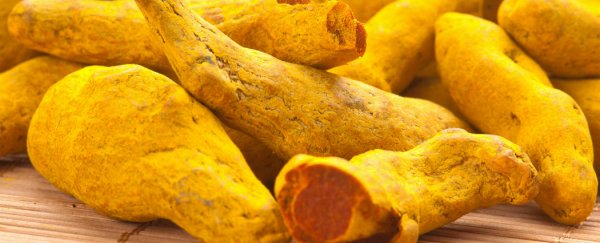A new study involving lab animals has found that curcumin, the naturally occurring, bright yellow compound used in curries, can actively impair the formation of fear-related memories in the brain, making it an intriguing new candidate for possible treatments for psychological disorders such as PTSD.
Extracted from the root of the turmeric plant (Curcuma longa), a species native to southeast India and related to ginger, curcumin has been used as a food additive and dye by Indian and East Asian cultures for many hundreds of years. And studies suggest that it doesn't just offer a distinct, slightly bitter, peppery taste - preclinical research has found that could also have several beneficial effects on the body, including anti-inflammatory, antioxidant, and neuroprotective properties (which means it actively preserves the structure or function of your neurons).
The compound is being studied as a potential treatment for everything from cancer and Alzheimer's disease to arthritis and heart disease, and now researchers are suggesting that it could also be used to treat people living with post-traumatic stress disorder, or PTSD.
This debilitating disorder currently affects as much as 8 percent of the US population, with returned military personnel being particularly susceptible. And despite its devastating effects, there aren't a lot of options for the treatment of PTSD. The only medications that have made it to market are antidepressants and sedatives, which can effectively mask the pain, but don't get to the heart of the problem - how fear-related memories are formed and stored in the brain. And that's if they work. Research has found that for up to 50 percent of the patients who have been prescribed these treatments, they don't actually work.
So the race is on to find something else to treat PTSD, and psychologists at the City University of New York in the US have been focussing on the potential of curcumin to do just that. They picked the popular root extract because it's already been shown to reduce symptoms of depression in both lab animals and people.
The team, led by psychologist Glenn E. Schafe, used a widely studied animal model of traumatic memory formation in PTSD, called the Pavlovian fear conditioning, to test the effects of curcumin. The Pavlovian fear conditioning model involves creating a negative association in an animal's memory with a particular object, place, smell, or sound. For example, you inflict a mild electric shock on a rat every time it explores a designated corner of its enclosure, and pretty soon it's going to start avoiding that spot like the plague.
The team's rats were split into three groups - two got regular food, and the third got food made with 1.5 percent curcumin added. The curcumin group ended up eating about 270 milligrams of the colourful extract each day, on average. Five days later, the fear conditioning began. Of the two groups fed on normal food, one was subjected to fear conditioning, and the other wasn't, so it could remain a control group.
The first experiment involved studying the effects of curcumin on the actual physical structure of the rats' brains. The team found that the spice was making its way to the lateral amygdala region of the brain, which is said to be an essential place for fear memory storage, in high enough amounts to actively stop the formation of these memories from being completed.
The second experiment backed up this find, as curcumin appeared to mess with the fear conditioning process. The rats were conditioned to be frightened of a particular sound, because when they heard it, they received an electric shock. Once the conditioning process was over, the model states that the rats will only have to hear the sound to make them freeze in fear, long after the electric shocks have stopped. The team found this to be true in the rats that fed on regular chow, but the rats on the curcumin diet? They didn't freeze in fear following the conditioning experiment.
The researchers report in the paper, published in Neuropsychopharmacology:
"The curcumin-enriched diet was observed to effectively impair the reconsolidation of both a recently formed (within 24 hrs) as well as an older, well-consolidated (two week old) fear memory, suggesting that even older fear memories are susceptible to reconsolidation impairment using this compound.
This latter finding adds to a growing body of evidence that amygdala-dependent memories are susceptible to reconsolidation interference regardless of their age, and has important implications for the use of reconsolidation-based approaches in a clinical setting given that many patients may not seek help immediately following a traumatic experience.
Finally, and perhaps most important from a clinical perspective, we show that fear memories that fail to reconsolidate under the influence of dietary curcumin are impaired in an enduring manner; we found no evidence that they are subject to reinstatement following an unsignalled foot-shock or to renewal following a shift in the testing context, both of which are trademark characteristics of fear memories that are lost due to fear extinction procedures."
Of course, rat brains are very different from human brains, so we can't jump to any conclusions just yet, but it sure is an intriguing result. One thing's for sure, if the body of research surrounding curcumin can tell us anything, it's that it's probably better to have this humble, yellow spice in your life, than not.
